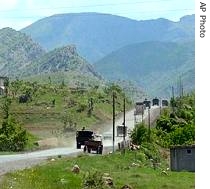2007年VOA标准英语-Kurdish Broadcast Rights Slow to Be Implemented(在线收听)
Hakkari
29 January 2007
Turkey's bid to join the European Union has ushered a flurry of reforms. Among them are measures that enable the country's long repressed ethnic Kurds to broadcast and publish in their formerly banned language. But the new freedoms have yet to be felt in some of the predominantly Kurdish regions. For VOA Amberin Zaman has details from the province of Hakkari that borders Iran and Iraq.

Turkish troops head toward the Iraq border in Hakkari (File photo - 5 May 2006)
From a cramped apartment overlooking Hakkari's gritty main boulevard the mournful sound of a popular Kurdish pop song fills the airwaves. Its called "Esmer" or "Dusky One," and, like so many Kurdish tunes, it is about unrequited love. The apartment is the headquarters of Hakkari FM, the town's first and only radio station.
Hakan Tas, who founded the Hakkari FM nine years ago, says half jokingly that Esmer's lyrics reflect his relationship with government officials here.
Tas says most officials treat him and his colleagues as outlaws. The reason is simple, he explains: It is because his station broadcasts in Kurdish.
There is nothing illegal about that. Bowing to EU pressure, Turkey's conservative government approved legislation last year that paves the way for private radio and television to broadcast in Kurdish. The content of Kurdish language broadcasts is strictly vetted for possible "separatist" propaganda and cannot exceed 45 minutes per day.
Operating on a shoe string budget and staffed by volunteers, Hakkari FM, Tas says, sticks by these rules. Turkish authorities take a different view. Tas has been slapped with several court cases, some of them on charges of promoting Kurdish nationalism. He believes the legal assaults are calculated to muzzle his radio station.
Rojbin Tugan, is a prominent human rights lawyers and, like many here, a diehard fan of Hakkari FM.
She says the station plays a key role in keeping locals informed of their rights.
Tugan and fellow rights defenders have used air time to talk about a government compensation scheme, for tens of thousands of Kurds, who were expelled from their villages by security forces at the height of a separatist Kurdish rebel insurgency in the 1990's.
In the neighboring town of Yuksekova, Necip Capraz and his younger brother Erkan run an award winning online newspaper called Yuksekova Haber. The website is considered as one of the most reliable sources of independent reporting from the far flung Kurdish region. Capraz says his aim is to provide an alternative viewpoint to the mainstream national press, which often espouses official thinking on Turkey's festering Kurdish problem.
Capraz boasts that his website is visited by an average one million readers a month. The paper achieved national fame in November 2005 when it broke news of the bombing of a Kurdish nationalist bookshop in the neighbouring town of Semdinli by rogue elements of the security forces, who are now in jail.
Capraz, who frequently receives anonymous threats, says that a fair share of his information comes from ordinary citizens. Naturally, he adds, such information is rigorously filtered and doublechecked before it makes its way onto the pages of Yuksekova Haber.